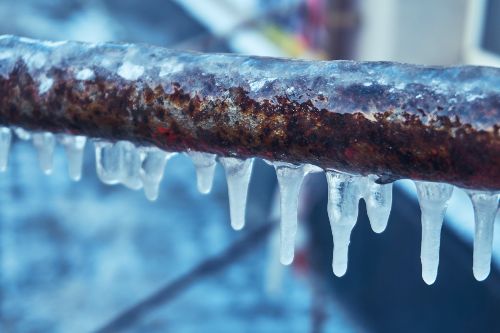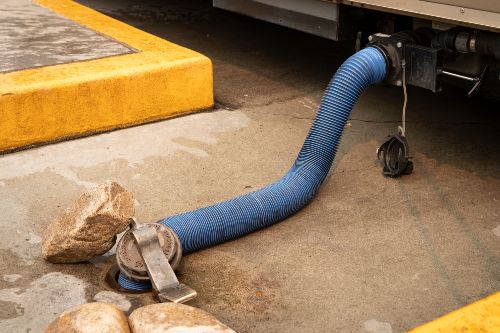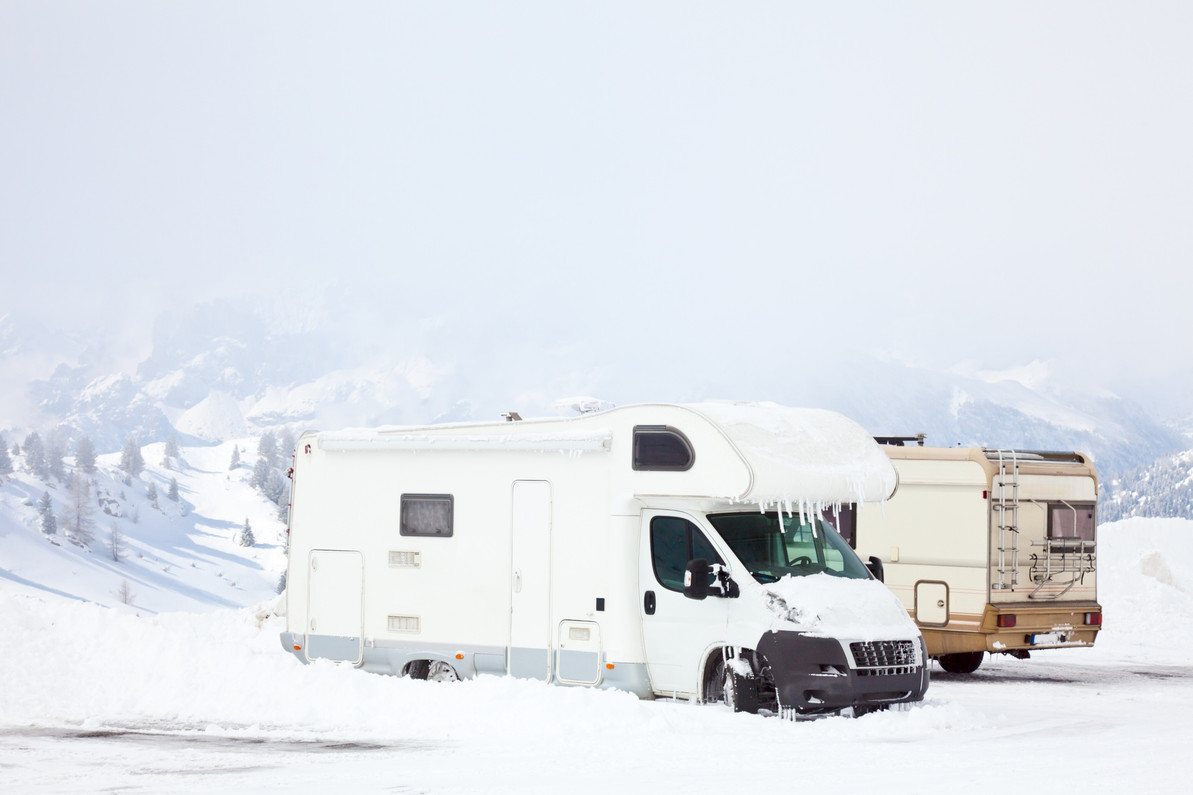How To Prepare For Cold-Weather RV Trips | RecPro
Steer Clear Of Frozen Pipes!
Though wintertime RV trips may not be the norm, they can still be quite enjoyable and rewarding experiences. To better make sure that you're well-prepared to take on the colder weather, there are certain steps you should consider before setting off into the unknown.
If you're planning on camping in cold weather, preventing your pipes from freezing is essential. Here are some tips to keep in mind:
- Invest in some form of water tank heater.
- Make sure your RV is adequately insulated.
- Use space heaters and electric blankets in conjunction with your furnace to keep warm & manage the ambient temperature.
- Keep an eye on your RV's temperature and ensure it stays high enough.
By following these tips, you can ensure that your next cold-weather camping trip is a success!
Tips to Prevent Frozen Pipes in Cold Climates
 Prolonged exposure to cold temperatures can cause significant damage to your RV. One of the most common problems is frozen pipes, which can break if left untreated. To prevent these issues when winterizing your RV, you should focus on heating water lines vulnerable to freezing temperatures. This heat can take many different forms, which we will explore below.
Prolonged exposure to cold temperatures can cause significant damage to your RV. One of the most common problems is frozen pipes, which can break if left untreated. To prevent these issues when winterizing your RV, you should focus on heating water lines vulnerable to freezing temperatures. This heat can take many different forms, which we will explore below.
While heating pads help provide direct heat to water tanks and will work if used correctly, they must be monitored constantly.
Alternatively, heating the ambient temperature of your tank storage location can help keep your pipes warm, minimizing the chances of freezing even on the coldest days of the year. Taking precautions like this and consulting with a trusted expert should help ensure you won't have any problems with frozen pipes!
How to Thaw a Frozen Pipe
Frozen pipes are a dangerous annoyance during cold months, but you can quickly fix them with careful handling. One of the more efficient methods is to use a heat gun, which works quickly and should do the job in no time. One must take care, however, as most heat guns will get hot enough to melt PVC pipes.
An alternative solution is to wrap frozen sections of pipes with resistive heat tape or heating blankets or to blow a hairdryer over the entire area of the frozen pipe until it begins to thaw. Heat tape and hairdryers may take longer than a heat gun, although they also pose fewer risks if carefully applied.
However, for larger frozen sections, the best method may be to use a portable propane heater underneath your RV; this will efficiently and quickly raise ambient air temp around the storage tank, helping frozen pipes to thaw without much physical effort or having to wait for an extensive amount of time.
Tips for Avoiding Frozen Pipes in an RV in the First Place
Preparing for winter in an RV can prevent frozen pipes in the coldest temperatures. Tank heating pads provide insulation for RV tanks and should be installed if winters are frigid. Adding additional insulation to exposed pipe runs underneath will assist in keeping the heat in, and the cold out.
Additionally, managing the RV's ambient temperature will help to regulate pipe temperatures.
Utilizing RV skirting around the underside will help keep the heat around your water storage tanks and ensure they stay warm enough to keep water flowing. These additional precautions will ensure a successful trip through even the worst of winter conditions.
Here are a few different options for proactive tank temperature management:
RV Skirting
What Should You Do if Your RV Water Pump Freezes?
 If you're an avid RV enthusiast, you know all too well the fear of having your water pump freeze. Temperature management is vital when it comes to making sure this never happens. Make sure to store your unit in a heated area if possible, and keep an eye on the environment around your RV – if temperatures dip below freezing, winterize as soon as possible! If you plan to camp in colder climates, you may need to invest in water storage heating options.
If you're an avid RV enthusiast, you know all too well the fear of having your water pump freeze. Temperature management is vital when it comes to making sure this never happens. Make sure to store your unit in a heated area if possible, and keep an eye on the environment around your RV – if temperatures dip below freezing, winterize as soon as possible! If you plan to camp in colder climates, you may need to invest in water storage heating options.
If you cannot get ahead of the cold weather, you can take some other steps. Disconnect and re-secure all external hoses, check for cracks or holes that water may escape from and pour antifreeze into the water tanks and drain lines to reduce the chances of a pipe burst. With care and proper preparation, you can ensure a safe road trip with no frozen pipes!
How to Keep Your RV Warm During Cold Weather Camping

Cold weather camping in an RV is be a great way to get outdoors and take advantage of the winter months, but it's essential to take precautions to ensure you stay warm and comfortable.
One of the most critical steps is insulation – make sure that insulation is sealed up tightly around windows, doors, and other spaces which could let in drafty air.
Another great way to keep your RV cozy is to install an RV skirt around its perimeter, containing the heat inside the trailer and blocking cold air from entering from underneath. Using insulation and an RV skirt, you can have a much more enjoyable cold-weather camping experience in your RV! A portable propane heater is often utilized in conjunction with an RV skirt to keep the rig's underside toasty warm.
Winter is knocking, so it's high time to prepare your RV for the cold weather. In this post, we shared some tips on how to prevent your pipes from freezing up, and how to thaw them out if they do freeze. We also discussed ways to keep your RV warm during winter camping trips.
Do you have any useful tips or strategies for keeping your RV comfortable & avoiding pipe freezes during cold weather? Let us know in the comments down below!
Recent Posts
-
Can You Put Regular Furniture in an RV?
Many new and old RV owners ask themselves this question when they feel the need to update th …Apr 25th 2024 -
4 Tips for Securing RV Furniture While Traveling | RecPro
How To Secure RV Furniture There are few things that beat going out on an adventure with an RV …Apr 25th 2024 -
How To Keep RV Furniture From Peeling
Peeling RV Furniture | Why it Peels and How to Stop it Your RV furniture is a point of pride on yo …Apr 25th 2024 -
Turning up the Heat With an RV Fireplace
There’s an unlimited number of cool and exciting features you could add to your recreational vehicle …Apr 25th 2024 -
How To Install An RV Fireplace
A Warm Addition to Your On-Wheels: The DIY RV Fireplace Installation Guide Many RV enthusiasts ask …Apr 25th 2024 -
Are RV Electric Fireplaces Safe
Being Safe in Your RV with an Electric Fireplace Safety is always going to be one of your highest …Apr 25th 2024







